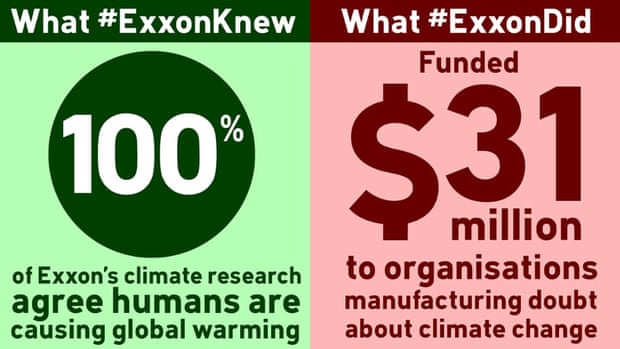
In a California court case this week, Judge William Alsup asked the two sides to provide him a climate science tutorial.
The plaintiffs are the coastal cities of San Francisco and Oakland. They’re suing five major oil companies (Chevron, ExxonMobil, Shell, ConocoPhillips and BP) to pay for the cities’ costs to cope with the sea level rise caused by global warming. Chevron’s lawyer presented the science for the defense, and most notably, began by explicitly accepting the expert consensus on human-caused global warming, saying:
From Chevron’s perspective, there is no debate about the science of climate change
Deniers filed briefs in support of the defense, but they contradicted Chevron’s tutorial. For example, one brief filed by a group led by Christopher Monckton and Willie Soon began by stating, “The “consensus” about global warming is 0.3%, not 97%” (this is obviously incorrect). Another brief filed by William Happer, Steve Koonin, and Richard Lindzen argued that “It is not possible to tell how much of the modest recent warming can be ascribed to human influences.” Chevron and the IPCC disagree.
While it’s normal for climate deniers to deny the 97% expert consensus that humans are driving global warming, those submitting briefs on behalf of Big Oil were clearly not on the same page as its lawyer. Perhaps the oil companies should have sent the deniers a memo to stay out of this case. Clearly these groups are accustomed to denying climate science on the oil industry’s behalf.
The judge mandated that those submitting briefs detail their funding sources, and they listed a litany of oil companies and fossil fuel-funded think tanks. Among those listed by Monckton and Soon’s group were ExxonMobil, the Heartland Institute, and the Charles G. Koch Foundation. Among those listed by Happer, Koonin, and Lindzen were the Heritage Foundation, Peabody Coal, the Cato Institute, and the Texas Public Policy Foundation.
It’s a perfect example of the oil industry’s two-faced behavior. For decades their own scientists quietly published peer-reviewed research concluding that humans are causing global warming. That was the face we saw from Chevron’s lawyer. But at the same time, oil companies were funding contrarian scientists and think tanks to spread denial and doubt about that same science. That was the face revealed in the denier briefs.

What #ExxonKnew vs what #ExxonDid. Illustration: John Cook, SkepticalScience.com.
Although they accept the expert climate consensus, the oil companies obviously don’t want to be held liable for the costs of the climate damages their products cause. In addition to emphasizing and exaggerating climate science uncertainties, Chevron’s lawyer noted that the IPCC states that climate change is caused “largely by economic and population growth,” not fossil fuel extraction. In other words, the oil industry’s strategy is to argue that individual climate impacts are difficult to pin down, and in any case, the blame lies not with the producers, but with the consumers of their products. It’s eerily similar to an argument made by tobacco industry lawyers:
Those who decide to start smoking or continue smoking should assume responsibility for a choice they make — because no one can say they don’t know about the dangers associated with smoking
In short, the industry lawyers argue that the consequences are the fault of smokers and energy consumers, not the companies producing the dangerous products.
That argument didn’t work for the tobacco industry in the past, because they knew of the health risks associated with consuming their products, yet engaged in campaign to manufacture doubt to convince people to keep smoking. Ultimately, a federal judge found the tobacco industry guilty of fraud to further a conspiracy to deceive the American public about the dangers of their products.
It’s a more difficult case to make against the oil industry because their scientists published climate research in peer-reviewed journals available to the public, and their campaign to manufacture doubt about human-caused climate change was waged through intermediaries. They funded think tanks to do their dirty work, as we saw in the denier briefs.
Tobacco industry executives continued publicly denying their own scientists’ findings to the very end, even under oath.
On April 14, 1994, the presidents and CEOs of the seven largest American tobacco companies were subpoenaed to testify before Rep. Henry Waxman’s House committee.
The oil industry has modified the tobacco playbook by accepting the scientific consensus. And Chevron’s lawyer argued that as a complex global problem, any climate remedies should be addressed through government policy rather than via the legal system.
Posted by dana1981 on Tuesday, 27 March, 2018
 |
The Skeptical Science website by Skeptical Science is licensed under a Creative Commons Attribution 3.0 Unported License. |